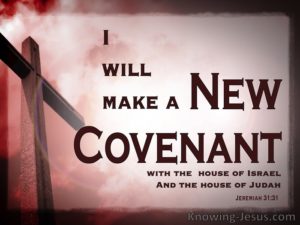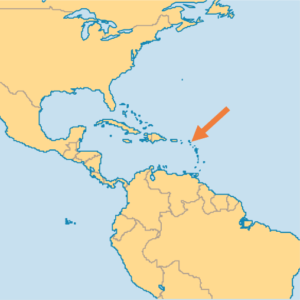OCTOBER 18- TODAY’S READING FROM THE ONE YEAR BIBLE- JEREMIAH 31:27-32:44; 1 TIMOTHY 3:1-16; PSALMS 88:1-18; PROVERBS 25:20-22
TODAY’S READING FROM THE OLD TESTAMENT- JEREMIAH 31:27-32:44
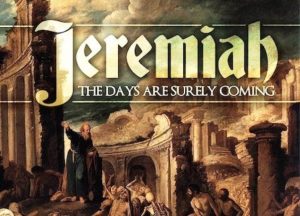 “The days are coming!” We hear this phrase echoing from the prophets Isaiah and Jeremiah. First, Isaiah prophesies to Hezekiah about the Babylonian conquest and destruction of the temple in Jerusalem and confiscation of the sacred items. (Isaiah 39:6; 2 Kings 20:16-17).
“The days are coming!” We hear this phrase echoing from the prophets Isaiah and Jeremiah. First, Isaiah prophesies to Hezekiah about the Babylonian conquest and destruction of the temple in Jerusalem and confiscation of the sacred items. (Isaiah 39:6; 2 Kings 20:16-17).
Then, Jeremiah takes up the refrain, prophesying a time of tribulation. The destruction of Jerusalem and the future new covenant are in view:
Jeremiah 31:27 27 “Behold, days are coming,” declares the LORD, “when I will sow the house of Israel and the house of Judah with the seed of man and with the seed of beast.
Jeremiah 31:31 31 “Behold, days are coming,” declares the LORD, “when I will make a new covenant with the house of Israel and with the house of Judah,
Jeremiah 31:38 38 “Behold, days are coming,” declares the LORD, “when the city will be rebuilt for the LORD from the Tower of Hananel to the Corner Gate.
Jeremiah 33:14 14 ‘Behold, days are coming,’ declares the LORD, ‘when I will fulfill the good word which I have spoken concerning the house of Israel and the house of Judah.
Not only is God’s chastisement and restoration of His covenant people (Israel and Judah) in view, but also the punishment of Babylon.
When we get to this chapter, we can better understand the words given to Jeremiah when he was first commissioned. He would be given the ministry of the Word of God- prophesying the plucking up, breaking down, destroying, and overthrowing of the disobedient with the certain hope that something better would be built and planted.
Jeremiah 1:10 10 “See, I have appointed you this day over the nations and over the kingdoms, To pluck up and to break down, To destroy and to overthrow, To build and to plant.”
It is because of God’s everlasting love that God’s promise remains steadfast (Jeremiah 31:3-4).
Jeremiah 31:10-11 10 Hear the word of the LORD, O nations, And declare in the coastlands afar off, and say, “He who scattered Israel will gather him and keep him as a shepherd keeps his flock.” 11 For the LORD has ransomed Jacob and redeemed him from the hand of him who was stronger than he.
Notice the details of the New Covenant promise:
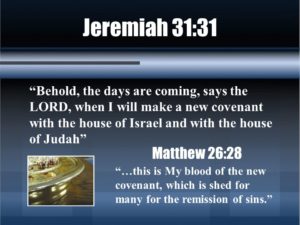 1. It is made with the house of Israel and Judah. (Jer. 31:31-32). Jesus inaugurated it in the upper room (Matthew 26:26-27; Luke 22:20)
1. It is made with the house of Israel and Judah. (Jer. 31:31-32). Jesus inaugurated it in the upper room (Matthew 26:26-27; Luke 22:20)
Jeremiah 31:31-32 31 “Behold, days are coming,” declares the LORD, “when I will make a new covenant with the house of Israel and with the house of Judah, 32 not like the covenant which I made with their fathers in the day I took them by the hand to bring them out of the land of Egypt, My covenant which they broke, although I was a husband to them,” declares the LORD.
Luke 22:20 20 And in the same way He took the cup after they had eaten, saying, “This cup which is poured out for you is the new covenant in My blood.
The promise is made to the houses of Israel and Judah, but the Gentiles will be indirect beneficiaries grafted into THE TRUE VINE.
John 10:16 16 “I have other sheep (Gentiles), which are not of this fold (Israel); I must bring them also, and they will hear My voice; and they will become one flock with one shepherd.
Jesus fulfills the demands of the conditional Mosaic covenant on behalf of the penitent and believing, Jew and Gentile, those whom the Father gives to Him. Those who believe become the beneficiaries of all of its promised blessings won for them through His obedience to the Law’s demand for righteousness. He offers His righteousness to the believer as a free gift!
This is in accordance with God’s unconditional covenant made with Abraham, where believing Gentiles also become indirect beneficiaries, heirs of the promise, receiving the blessing from the Promised Seed (Christ Jesus).
Genesis 12:3 3 And I will bless those who bless you, and the one who curses you I will curse. And in you all the families of the earth will be blessed.”
- The law will be put within them (the Law of the Spirit of Life in Christ Jesus- Romans 8:2) and written on their hearts.
 Jeremiah 31:33a 33 “But this is the covenant which I will make with the house of Israel after those days,” declares the LORD, “I will put My law within them and on their heart I will write it;
Jeremiah 31:33a 33 “But this is the covenant which I will make with the house of Israel after those days,” declares the LORD, “I will put My law within them and on their heart I will write it;
Romans 8:2-3 2 For the law of the Spirit of life in Christ Jesus has set you free from the law of sin and of death.
He promises to put His standard of righteousness within us- the indwelling Spirit of Christ. He seals believers with the eternal life of the Holy Spirit.
- God will take people to Himself who will truly and intuitively know Him by the witness of the Spirit of Christ.
Jeremiah 31:33b-34 and I will be their God, and they shall be My people. 34 “They will not teach again, each man his neighbor and each man his brother, saying, ‘Know the LORD,’ for they will all know Me, from the least of them to the greatest of them,” declares the LORD,
Romans 8:16 16 The Spirit Himself testifies with our spirit that we are children of God,
- God will offer them total forgiveness.
Jeremiah 31:34 “for I will forgive their iniquity, and their sin I will remember no more.”
The Book of Hebrews reminds us that it is ‘in Christ’ that something better will be built and planted- His church, a new covenant community.
Hebrews 8:6 6 But now He has obtained a more excellent ministry, by as much as He is also the mediator of a better covenant, which has been enacted on better promises.
The laws of the New Covenant are written on the heart, rather than on stone. Under the Old Covenant, the sins of the house of Judah were engraved on their stony hearts, serving them condemnation.
Jeremiah 17:1 1 The sin of Judah is written down with an iron stylus; With a diamond point it is engraved upon the tablet of their heart and on the horns of their altars,
Ezekiel 36:26-27 26 “Moreover, I will give you a new heart and put a new spirit within you; and I will remove the heart of stone from your flesh and give you a heart of flesh. 27 “I will put My Spirit within you and cause you to walk in My statutes, and you will be careful to observe My ordinances.
In Jeremiah Chapter 32, Jeremiah is being held in stocks as a prisoner in the courtyard of the palace. King Zedekiah and Jerusalem are on the threshold of disaster as the Babylonian army begins to besiege the city walls. Zedekiah gives evidence that he has heard the word of God, as he can recite it back to Jeremiah (32:3-5). He hears, but does not believe, and therefore does not repent.
In contrast to King Zedekiah’s unbelief, Jeremiah is prompted by the Spirit to take prophetic action and invest in Jerusalem, even though all hope for the future seems to be lost. He purchases real estate in Anathoth and tells his comrade, Baruch, to put the deed in a secured clay pot that will last for a long time.
Jeremiah 32:15 15 ‘For thus says the LORD of hosts, the God of Israel, “Houses and fields and vineyards will again be bought in this land.”
Jeremiah 32:17 17 ‘Ah Lord GOD! Behold, you have made the heavens and the earth by Your great power and by Your outstretched arm! Nothing is too difficult for You,
Jeremiah 32:27 27 “Behold, I am the LORD, the God of all flesh; is anything too difficult for Me?”
The Lord makes it clear before He brings the final judgment (pulling down, rooting out, destroying, and overthrowing) that He is in the right in doing so.
He knows their horrible sins, even offering child sacrifices to the god Molech.
Jeremiah 32:35 35 “They built the high places of Baal that are in the valley of Ben-hinnom to cause their sons and their daughters to pass through the fire to Molech, which I had not commanded them nor had it entered My mind that they should do this abomination, to cause Judah to sin.
The Lord promises that after the destruction and chastisement of the 70-year captivity, He will build and plant His people anew.
Listen to this new covenant promise:
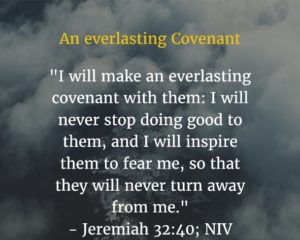 Jeremiah 32:38-41 38 “They shall be My people, and I will be their God; 39 and I will give them one heart and one way, that they may fear Me always, for their own good and for the good of their children after them. 40 “I will make an everlasting covenant with them that I will not turn away from them, to do them good; and I will put the fear of Me in their hearts so that they will not turn away from Me. 41 “I will rejoice over them to do them good and will faithfully plant them in this land with all My heart and with all My soul.
Jeremiah 32:38-41 38 “They shall be My people, and I will be their God; 39 and I will give them one heart and one way, that they may fear Me always, for their own good and for the good of their children after them. 40 “I will make an everlasting covenant with them that I will not turn away from them, to do them good; and I will put the fear of Me in their hearts so that they will not turn away from Me. 41 “I will rejoice over them to do them good and will faithfully plant them in this land with all My heart and with all My soul.
TODAY’S READING FROM THE NEW TESTAMENT – 1 TIMOTHY 3:1-16
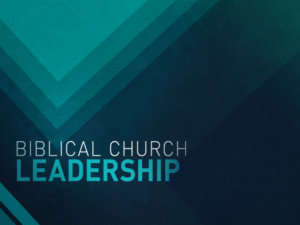 Paul continues to address the appropriate house rules for the New Testament community. Men are encouraged to prayerfully intercede and serve as spiritual leaders in their home, along with their wives, who are submitted to their headship. Women partner appropriately in their service to their families and the church. They serve with their spiritual gifts in many kinds of ministry, yet their official teaching role is in the context of ministry to other women and children.
Paul continues to address the appropriate house rules for the New Testament community. Men are encouraged to prayerfully intercede and serve as spiritual leaders in their home, along with their wives, who are submitted to their headship. Women partner appropriately in their service to their families and the church. They serve with their spiritual gifts in many kinds of ministry, yet their official teaching role is in the context of ministry to other women and children.
In Chapter 3, Paul lists the qualifications needed for elders and deacons. The word for ‘overseer’ (episcopos) is used synonymously with the words for ‘elder’ (presbuteros) and ‘pastor’ (poimen). To provide oversight, protection, and shepherding through the Word of God is a noble aspiration (1 Tim 3:1) and should be discerned as a Spirit-wrought calling (Acts 20:28). It is not something that should be entered into casually. James, and the writer of Hebrews, reminds us that the elders must give an account to God, and will be judged more strictly (Hebrews 13:17; James 3:1). They have the responsibility to lead, feed, guide, protect, equip, encourage, pray for, and minister to the flock of God as undershepherds.
It is interesting to note that the qualifications for deacons and elders are those that would be fitting for any and every mature Christian. The only difference between the qualifications of the elder and the deacon is that the elder needs to be competent to teach the Word (1 Timothy 3:2), exhorting the local church with sound doctrine and refuting those who contradict that doctrine (Titus 1:9).
The word ‘deacon’ is an English transliteration of the Greek word for ‘servant’ (diakonos). So, a ‘deacon’ is understood as being a recognized servant of the church. The first people we see appointed in this kind of capacity are those who were chosen to assist the apostles in Jerusalem, relieving them of the mounting responsibilities of caring for the needs of the flock. In Acts 6, they were Spirit-filled men appointed to minister to the needs of the Grecian widows who were being neglected in the daily administration of food. This responsibility involved wisdom, discernment, and a general competency in providing counsel and care. Although they are not specifically referred to as ‘deacons’ in this case, we can assume that they were carrying out ‘deaconate’ responsibilities as recognized servants of the local church.
The deacons must share the basic doctrinal convictions of the church leaders and work at promoting unity (3:9). Potential deacons should be tested before they are asked to be servant leaders (3:10).
Whether the office of deacon is open to men and women is debated, and the wording in the original language is somewhat ambiguous. Phoebe, in the original Greek text, is called a deaconess (servant) in Romans 16:1. The adjective (semnos), meaning honorable, grave, or dignified, is arbitrarily translated as ‘men of dignity’ in the NASB but is not tied to either the male or female sex. The same adjective is used to describe ‘women’ or ‘wives’ in verse 11.
Paul lets Timothy know that he intends to visit him personally, but in the meantime, he encourages Timothy to instruct the church so they will know how to conduct their lives as a new testament community:
1 Timothy 3:15 15 but in case I am delayed, I write so that you will know how one ought to conduct himself in the household of God, which is the church of the living God, the pillar and support of the truth.
What truth is the church to uphold? The church is to uphold the gospel truth, the open secret of Who God is and what He has done in the person of His Son, the Lord Jesus Christ, the mystery of godliness made known to mankind.
1 Timothy 3:16 16 By common confession, great is the mystery of godliness: He who was revealed in the flesh, was vindicated in the Spirit, seen by angels, proclaimed among the nations, believed on in the world, taken up in glory.
TODAY’S READING FROM THE BOOK OF PSALMS- PSALMS 88:1-18
 Some commentators have called Psalm 88 the saddest Psalm in the Psalter. It carries the tone of abandonment and forsakenness by God. The sufferings of the Psalmist bring to mind the sufferings of Christ on the cross.
Some commentators have called Psalm 88 the saddest Psalm in the Psalter. It carries the tone of abandonment and forsakenness by God. The sufferings of the Psalmist bring to mind the sufferings of Christ on the cross.
There is no trace of bitterness or vindictiveness, no crying out for revenge or anger towards God. Instead, the character of God is kept before His eyes unsullied.
Is this Psalmist not like Jesus?
Hebrews 12:2 2 fixing our eyes on Jesus, the author and perfecter of faith, who for the joy set before Him endured the cross, despising the shame, and has sat down at the right hand of the throne of God.
The writer remains sure of God’s goodness, His grace, and His justice. He references His lovingkindness, faithfulness, wonders, and righteous deeds, even while in the throes of deep sorrow and suffering (Psalm 88:10-12).
TODAY’S READING FROM THE BOOK OF PROVERBS – PROVERBS 25:20-22
Proverbs 25:20-22 20 Like one who takes off a garment on a cold day, or like vinegar on soda, is he who sings songs to a troubled heart. 21 If your enemy is hungry, give him food to eat; And if he is thirsty, give him water to drink; 22 For you will heap burning coals on his head, And the LORD will reward you.
We are to weep when our brothers weep and rejoice when they rejoice. Our ministry to others should be well-matched and well-timed, as we consider their needs.
PRAY FOR THE NATIONS
St. Barthélemy, St Helena, Samoa
St Barthélemy
 Collectivity of Saint Barthelemy
Collectivity of Saint Barthelemy
Caribbean
Geography
One main island and several small islets in the Leeward Islands.
Population: 9,300 Annual Growth: 2.06%
Capital: Gustavia
Peoples
Official language: French (specifically a Norman dialect), English
Religion
Largest Religion: Christian
|
Religion |
|
Pop % |
Ann Gr |
|
5,673 |
61.00 |
1.4 |
|
|
210 |
2.3 |
3.2 |
Challenges for Prayer
This island caters to the uber-rich, trading on its sophistication and isolation for its exclusivity. There is little interest in spiritual things. Pray that amid the boutiques, cafés and villas there might awaken a hunger for spiritual reality and the opportunity to know God. Pray also that the few churches on the island might minister meaningfully into this unique context.
St Helena
 British Overseas Territory of St. Helena
British Overseas Territory of St. Helena
Africa
Geography
Area: 412 sq. km
St Helena (122 sq. km), 2,000 km west of Angola in the south Atlantic. Two dependencies: Ascension Island (90 sq. km), 600 km to the northwest, and Tristan da Cunha (100 sq. km), 1,200 km to the south. Also, several uninhabited islands.
Population: 4,406 Annual Growth: -1.34%
Capital: Jamestown
Urbanites: 39.7%
Peoples
Official language: English Languages: 1 All languages
Religion
Largest Religion: Christian
|
Religion |
|
Pop % |
Ann Gr |
|
4,172 |
94.70 |
-1.6 |
|
|
389 |
8.8 |
0.5 |
Challenges for Prayer
The isolation of the islands makes vibrant ministry and church life a huge challenge. Connection to the outside world and to Christian resources is limited. The small and more transient populations of Ascension and Tristan have even less evangelical presence and ministry, if any.
Samoa
Pacific
Geography
Two large volcanic islands, Savai’i and Upolu, and seven small islands covered by lush tropical rainforest.
Population: 178,943 Annual Growth: 0.00%
Capital: Apia
Urbanites: 23.4%
HDI Rank: 94 of 182 (UN Human Development Reports 2009)
Peoples
Official language: Samoan; English Languages: 2 All languages
Religion
Largest Religion: Christian
|
Religion |
|
Pop % |
Ann Gr |
|
172,859 |
96.60 |
0.0 |
|
|
32,263 |
18.0 |
0.7 |
Challenges for Prayer
Samoans have been Christian for over a century, and every village has at least one church. But the traditional class structure and pre-Christian cultural standards were not necessarily transformed by the gospel. Much of the Church suffers from nominalism, and rivalry among denominations does not generate a good spiritual atmosphere. Pride and politics influence church life too much, and the financial demands on a poorer population are heavy. These, coupled with the modern challenges of domestic strife and imported moral vice, make for a society in need of prayer.
PRAYER: Lord, we thank You for the sanctifying ministry of Your Word. It roots out, breaks down, destroys and overthrows the rule of our old sin nature and builds us up and establishes us in our true identity and inheritance in Christ. Truly, you have given us a hope and a future. Help us keep Your lovingkindness, faithfulness, and eternal promise in view when we go through dark times. Deepen our trust and solidify our convictions so that we will stand out so as to be a pillar of truth in our locality. May our behavior support (and not undermine) the words that we say. In Jesus’ Name. Amen.

